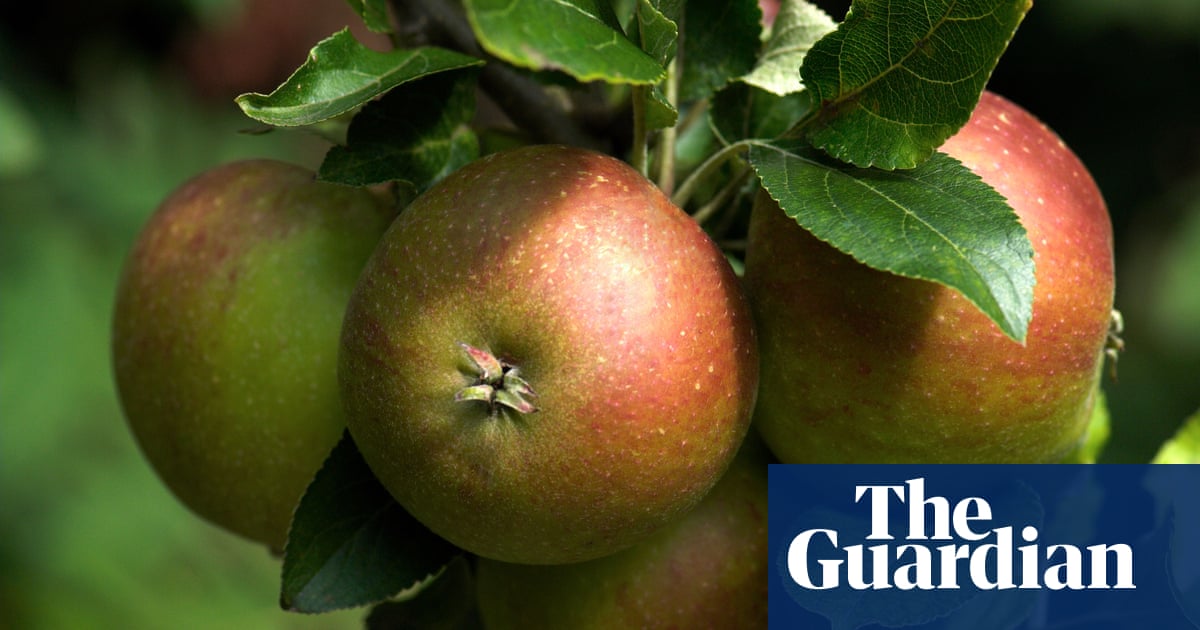
Classic British apples may die out and be swapped for varieties from New Zealand and Japan, as climate breakdown means traditional fruits are no longer viable.
Apples such as pippin or the the ancient nonpareil, grown in Britain since the 1500s, are struggling in the changed climate because there are not enough “chilling hours” for the trees to lie dormant in winter and conserve energy for growing fruit.
Scientists at Royal Botanic Gardens, Kew, are planting 40 apple trees, a third of which are heritage varieties that once grew in its Georgian kitchen gardens. Another third are new varieties bred to need less cold over winter, and the final third are from warmer countries including South Africa. The varieties will be compared to see which has the best crop in London’s warming temperatures.
In January, the Met Office announced that 2022 had been the sixth warmest year on record, and it looks as if 2023 will be another record-breaker. But though many crops are affected by the summer’s intense heat and drought, apple trees are struggling because they need a period of cold over the winter.
In autumn, they store enough energy to see them through the dormant period, and then burst into action again in spring. Perfect chilling hours for apples are those below 6C but above freezing, and most traditional apple trees need about 1,000 chilling hours. If temperatures remain above 6C then they have to respire, using up energy stores throughout the winter period, which in turn limits the stores available in spring, meaning fewer apples grow.
Gala apples are a popular variety grown in New Zealand, but the horticulturalist Helena Dove, who runs Kew’s kitchen garden, said the breed may overtake traditional varieties in Britain.
“The Gala was bred in New Zealand, which means it only needs about 600 chilling hours, which is more like what we’re getting at the minute in the UK,” she explained.
“We will see if gala has a better crop than nonpareil, which was bred in 1696. We are also trying the Fuji apple, which originated in Japan and only needs 400 chill hours, which might do better in these milder winters.”
When some of the most beloved heritage varieties of British apple were bred, she said: “We had these lovely cold winters, which we aren’t getting any more.”
Dove hopes to have a crop in three years, and to be able to share some preliminary findings with the industry then. Farmers are ripping out orchards because of climate breakdown and a lack of workers, and she hopes this research could bolster the industry.
“This chilling hours conversation is happening,” she said, “because it’s not just apples, pears and blackcurrants that have this feature where they need to stay dormant.”
However, it is not certain that these new varieties will be the solution: “We could find out that we don’t get a dry enough winter for these varieties. So this is why it’s an experiment, because South Africa doesn’t have the wet weather that we have. So it’s going to be whether they’ve got low chill hours and can cope with the amount of rain.”
Apples on the way out
Egremont russet is a classic English russet apple from the Victorian era. Apple aficionados love its flavour and appearance.
Nonpareil apples originated in France but have grown in the UK for hundreds of years. It is popular due to its pear-drop flavour.
Cox’s orange pippin apples are what springs to mind when you think of the classic English fruit; with blushing orange and red skin that gives way to patches of green.
Potential replacements
Gala apples are ubiquitous in the supermarket. They are crisp, juicy and a pinkish red but critics may say they do not have the complex, floral flavours of the classic English apples listed above.
Fuji apples are a modern variety that originated in the Tohoku research station in Fujisaki, Aomori, Japan, in the late 1930s, and was brought to market in 1962. It is a cross between two American apple varieties: the red delicious and old Virginia Ralls Janet apples. They taste sugary sweet, like bottled apple juice.












